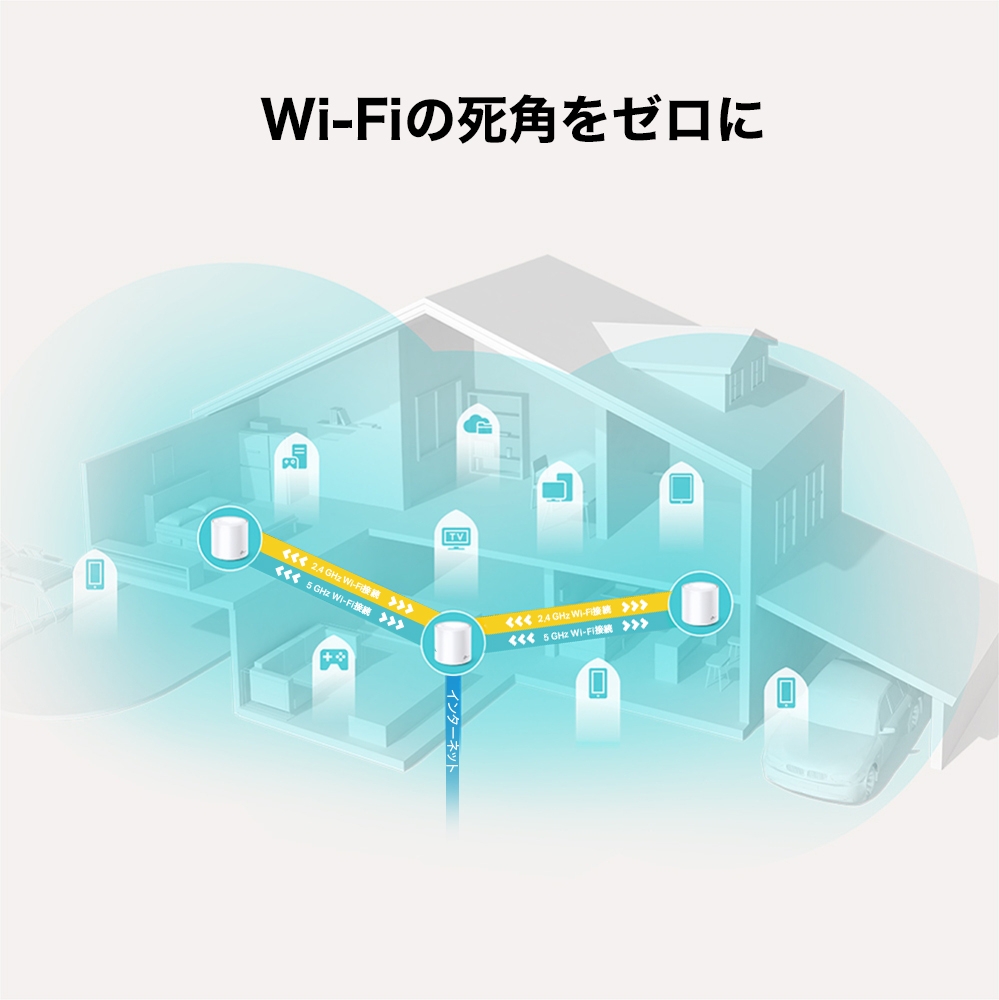Deco X20
人気AX1800 メッシュWi-Fiシステム
- 超高速:高速の新規格WiFi 6テクノロジーに対応し、両バンドで合計最大速度1800Mbps(1201+574Mbps)を提供します。
- 接続台数増加:通信を効率化するOFDMAとMU-MIMO技術が最大接続可能台数を大幅に引き上げました。
- シームレスなメッシュWiFi:WiFi 6の特徴であるノイズへの強さと、メッシュWiFiを組み合わせることでさらに広い範囲でインターネットに接続できます。
- 超低遅延:遅延削減により、反応速度が求められるオンラインゲームやビデオ通話がよりスムーズに行えます。
- 接続先は1つだけ:複数のDecoユニットを使用し、2.4GHzと5GHzを両方とも利用しても表示されるSSIDは1つだけです。
- セキュリティ:新しい暗号化規格WPA3とTP-Link HomeCareTMに付随しているアンチウイルスや保護者による制限機能によってより安全にインターネットを利用できます。
- かんたん設定:設定は専用アプリで画面表示の沿って進めるだけです。
次世代のメッシュWi-Fi
AX1800 メッシュWi-Fiシステム


Wi-Fi 6×メッシュ
Decoが新規格のWiFi 6テクノロジーに対応しました。広範囲までWiFiを行き渡らせるメッシュWiFiによって、さらに高速で遠くまで届くようになり、接続可能台数も大幅に増加しています。△
-
Wi-Fiの死角ゼロ
-
シームレス
ローミング -
最大接続台数
150台 -
超高速Wi-Fi 6
-
超低遅延
Wi-Fiの死角をゼロに
メッシュWiFiにBSS Colorとビームフォーミングを掛け合わせることで、広い帯域を持つWiFi 6と有線のバックホールの組み合わせが、広範囲でシームレスなWiFiを実現します。†もし届かない場所があっても、Decoを追加すればさらに範囲を拡張できます。
悩まず使えるシームレスローミング
Decoは複数台で連携して単一のSSID(WiFiの名前)を持つ広大なWiFiネットワークを形成。各スマートフォンやタブレットをその中で最も速度の出るユニットに自動で接続してくれます。‡
もっと繋がる
WiFi 6は混雑した状況下でのスループットが従来規格比の4倍なので、軽快なネットワークを楽しめます。△
実際のテストでは、Deco X20に150台以上の端末を接続してもパフォーマンスを維持したまま利用可能でした。†
-
3倍高速なダウンロード
-
20台IPカメラの
ストリーミング -
40台720Pでの
ストリーミング -
45台ウェブの閲覧
-
35台IoT機器
-
5台4Kでの
ストリーミング -
x101080Pでの
ストリーミング
2019年12月にTP-Linkが実施した複数のアプリケーションのテスト
Wi-Fi 6ならお待たせしません
1024-QAMと高シンボルレートによって速度が最大1.8Gbpsまで向上し、クラウドゲーミングや4K UHD等の重いタスクを処理しながらでも、家族の回線を落とすことなくインターネットを利用できます。△†
-
1024-QAM1度により多くのデータをエンコード
-
高シンボルレート11%高速化
ラグなしで、さらにエンジョイ
安定し軽快なレスポンスを提供するWiFi 6は、コネクテッドホームの根幹に最適です。WiFi 6対応機器なら同時に複数接続・通信をしても快適に楽しめます。△
 HomeCareTM
HomeCareTM
まるごと保護
TP-Link HomeCareTMに内蔵された複数のセキュリティ機能でネットワーク管理をサポート。センシティブなデータの取り扱いや、お子様やゲストのインターネット利用の制限等、ご家庭のネットワークを管理するために必要なツールを提供します。
-
保護者による制限
不適切なコンテンツへのアクセスと、インターネット利用時間を制限
-
アンチウイルス
接続している全端末をオンライン上の脅威から保護
-
QoS
必要に応じて端末やアプリケーションを優先して通信
設定はかんたんです
Decoを箱から出したら、スマートフォンにアプリをインストールし、画面表示に沿って進めるだけなので設定はすぐに終わります。
-

1 Decoをモデムと接続し、両者の電源を入れます。
-

2 Decoアプリを起動し、画面表示に沿って設定を行います。
-

3 複数のDecoを利用する場合は追加設定を行います。
Wi-Fiをもっと手軽に
-
かんたん管理
各端末の接続情報やゲストネットワークの開設・QoSの設定等をアプリから行います。
-
音声コントロール
Alexaに対応しており、Deco X20のいくつかの機能を音声で呼び出すことができます。

-
全てのDecoと併用可能
Deco X20は全てのDecoシリーズと互換性があります。下位機種の追加や上位機種との入れ替え・サテライト化も自由自在です。
Related Cases
What is Mesh WiFi?
A Guide to Whole Home Mesh WiFi in 2021
Learn everything you know about a mesh WiFi network
For many years mesh WiFi was used exclusively in areas such as businesses bases where secure networks were critical. Recently mesh WiFi entered the consumer market, providing consumers access to a secure high speed and long range WiFi network.
In this post, we’ll be explaining what mesh WiFi is, who it’s for, and some great options to get you started.
What is Mesh WiFi?
Mesh WiFi is a whole home WiFi system built to eliminate dead zones and to provide uninterrupted WiFi throughout your home.
Mesh systems enables devices in your network to have faster speeds, greater coverage, and a more reliable connection. While traditional routers broadcast WiFi from a single point, mesh WiFi systems have multiple access points.
When one unit links to the modem, that unit becomes the main hub. The other units (called “nodes”) will capture and rebroadcast the router’s signal. The result is an efficient wireless network that provides a strong signal no matter where you are.
Who needs Mesh WiFi?
Mesh WiFi is built for people who live in homes with weak or incomplete WiFi coverage as well as people who want an uncomplicated easy to set up WiFi System.
Because traditional routers have a limited range; they are often unable to fully cover multi story or large homes. If you live in a home that’s 3,000 sq. ft., has two stories or more, interior brick walls, or an unusual layout, then you would benefit from a mesh WiFi router.
Mesh WiFi also represents a great option for people who are interested in a powerful WiFi system but don’t want to deal with the complicated setup and configuration that most regular routers come with.
Since mesh operates on a single network, mesh WiFi is also a great option for people who own range extenders and don’t want to switch between networks as they move upstairs or downstairs.
What are the Benefits of Mesh WiFi?
Traditional routers come with a limited range. While adding a range extender can help with this issue, range extenders sacrifice speed for connectivity. Mesh WiFi gives you the best of both worlds – so you can experience both powerful speeds and long-range connectivity.
One Network for Your Entire Home
With a Mesh WiFi router, you can skip signing into a new network every time you go upstairs and stay connected to a single sturdy network no matter where you are. Mesh technology is smart and intuitive, letting you stay online even if one of your mesh nodes fails.
Stable Long Range Connectivity
With a mesh router, you can get a powerful and stable connection no matter where you are in your home. Because each mesh node piggybacks off the other nodes signal, you can get powerful WiFi whether you’re at the top of the stairs or the bottom of the basement.
Easy Setup and Management
Most mesh routers on the market today come with easy network setup and management, allowing you to toggle network settings, check speeds, and enact parental controls.
Control Your Smart Home
Some mesh routers like the TP-Link Deco M9 Plus are so advanced that they function as a WiFi router and a smart hub, connecting your Zigbee, Bluetooth and WiFi devices and enabling you to manage all your smart devices through the Deco app.
How does Mesh WiFi Work?
Mesh WiFi works by using two or more mesh WiFi devices or “nodes” to create a mesh WiFi network.
One node is connected to an internet modem, while the rest can be placed throughout your home to create a powerful wireless network. Unlike traditional routers, these nodes are all part of the same network and share the same SSID and password. This makes setting and scaling up your mesh network as easy as adding another node.
These nodes are important in efficiently delivering WiFi, as each node serves as a “daisy chain” for other nodes in the system. Even nodes that are furthest from the router can still deliver a strong signal. Nodes
communicate with one another in order to determine the fastest band for your devices, and to reroute traffic in the event that one node fails.
What’s the difference between Mesh WiFi and a Range Extender?
While mesh WiFi and Range extenders might appear to have the same functionality, there are some key differences.
Mesh WiFi devices comes with roaming protocols (to keep you on the same network) and mesh technologies such as self-healing and adaptive routing to keep your network stable.
Range extenders require you to sign on to a new network manually in order to maintain a strong connection once you’re far enough away from your router.
Most range extenders are set up under different networks; but with mesh networks there are no other networks to worry about. While each mesh node essentially functions as its own router, range extenders are merely duplicating the routers original signal.
Mesh WiFi is faster and more efficient at delivering a WiFi signal than a range extender.
Side note: While our Deco M3 (3-pack) uses mesh satellites that look similar to range extenders, the two are not interchangeable. These mesh satellite units use similar technology and logic to create a powerful mesh WiFi system that range extenders cannot.
Mesh WiFi Features
One Name. One Password
Mesh WiFi allows you to sign into your network with just one network name and one password to receive seamless WiFi throughout your home.
Seamless Roaming
Seamless roaming allows you to stay connected to your network no matter where you go in your home. Switching from one mesh node to another is so smooth that it’s unnoticeable even when you’re streaming.
Adaptive Routing
Mesh WiFi routers use adaptive routing to automatically choose the best configuration and band for your data, so that you’re always getting the fastest possible speeds.
Self-Healing
In the event that one of your mesh WiFi nodes goes down, your Mesh WiFi network will automatically reroute data to make sure you stay online.
Conclusion
Since its launch, mesh WiFi has grown quickly and been enthusiastically embraced by the general population for its convenience, ease of use, and easy set up. You can click the TP-Link Mesh product list to see all deco mesh routers.
Common Questions regarding Mesh WiFi
Do I have to purchase a new router to get mesh WiFi?
No you don’t! You can upgrade your existing compatible TP-Link router to OneMesh via a free firmware update, and pair with a compatible mesh extender or powerline extender to receive mesh WiFi.
You can click the compatible TP-Link router list to see all applicable models.
Will Mesh WiFi work if I have brick, stucco, or concrete walls in my house?
Yes! Mesh WiFi systems will work in houses with these conditions. However, most routers (including mesh WiFi) may experience some drop in connectivity due to environmental factors.
If you have overly thick walls, you might be better served by getting a powerline extender.
Does mesh WiFi work with my older devices?
Yes it does!
Where can I find mesh WiFi products?
Many solutions are on the market. You can find mesh networking products on Amazon, Walmart, Costco, Newegg and other placed where electronics are sold.
Does TP-Link sell any mesh WiFi products?
Yes we do! You can click the TP-Link Mesh product list to see all deco mesh routers.
Our most popular Mesh WiFi products is our Deco series. With our Deco routers, you can set up your network in minutes, easily manage your network settings through the app, get seamless coverage throughout your home, plus all the benefits above.
Deco Mesh WiFi vs Google WiFi
With over two decades in global networking, we know what it takes to make great WiFi. Which is why it’s no surprise that Deco outperforms Google WiFi in both wireless range and speed.***
- First Floor
- Second Floor
- Coverage
- No coverage
| Room | Deco | Google WiFi |
|---|---|---|
| Living Room | 334.91 Mbps | 173.86 Mbps |
| Home Office | 1004.76 Mbps | 795.11 Mbps |
| Bedroom | 394.60 Mbps | 307.50 Mbps |
| Home Theater | 608.80 Mbps | 365.62 Mbps |
Deco Mesh WiFi Home Security
Hardware Security
Deco only gets better and more secure with automatic firmware updates, and its firewall only allows approved packets onto your devices.
Advanced Encryption
Deco automatically encrypts every wireless connection using WPA2-PSK, whether it’s between each Deco unit or between Deco units and your WiFi devices.
Real-Time Antivirus
Deco automatically protects every device from viruses, malware, ransomware. That includes devices that don’t normally have protection, like WiFi cameras and smart locks.
Content Filtering
Create profiles and filter content using preset or customized lists while Deco automatically blocks malicious websites using a continuously updated database.
アプリでかんたんに
Decoを操作!
iOSかAndroidを搭載したモバイル端末にDecoアプリをインストールすれば、ネットワークの初期設定・管理・監視がかんたんに行えます。
シンプルな操作画面
ソファの上だろうが仕事中だろうがDecoのWi-Fiはいつでもどこからでも簡単に管理ができます。
-
シンプルなダッシュボード
ネットワークの状況や接続中の端末などのチェックを直感的に行えます。
-
複数のDeco達も1つのアプリで
Decoアプリは、すべてのDecoネットワークとDecoのWi-Fiに接続されているすべてのデバイスを管理します。
-
接続中の端末もひと目でわかる
接続中の端末リストから、各端末のインターネットの一時停止・通信速度の確認・優先の有無やブロックが可能です。
-
すべての管理もアプリから
保護者による制限機能やWi-Fiの設定なども同様に
アプリから簡単に行えます。
保護者による制限機能
シンプルかつ直感的なアプリデザインなので、かんたんに子供たちを
インターネットの脅威から遠ざける事が出来ます。
-
家族それぞれのプロファイルを簡単に作成し、それぞれに時間制限とオンライン時間を設定します。デバイスにプロファイルを割り当てると、ルールは個々のデバイスや家族にも適用されます。
-
年齢に応じたセキュリティ フィルターのレベルをワンタッチで選択できます。
-
家族それぞれに、インターネットの利用時間制限を設定することができます。
-
子どもたちがどのようなサイトをどれだけ確認する事ができ、危険なウェブサイトを閲覧していないかをかんたんに確認が可能です。
-
食事中や家族団らんの時間は、ワンタップで家族全員のインターネットを一時停止する事が出来ます。
多彩な機能を備えた直感的なアプリ
利用状況の月間レポート
セキュリティ上の脅威・ブロックしたコンテンツ・利用状況などの包括的な月間のレポートを作成・報告をします。
便利な自動化
オートメーション化と音声コントロールで生活をぐっと便利にします。
*現在はDeco M9 Plusのみ対応です。
様々なショートカット
スマートフォンやタブレットからワンタップで柔軟に操作が出来ます。
*現在はDeco M9 Plusのみ対応です。
ネットワークを保護
内蔵のアンチウイルスソフトが悪意のあるウェブサイトからあなたを遠ざけ、安全なオンラインショッピングを提供します。
*現在はDeco M9 Plus、Deco M5のみ対応です。
特定のデバイスを優先
特定のデバイスを常に、もしくは特定の時間優先して高速で通信させます。
特定のアプリケーションを優先
一番好きなアクティビティを優先させることが可能です。
*現在はDeco M9 Plus、Deco M5のみ対応です。
お客さんにWi-Fiを開放
ゲスト用のWi-Fiネットワークを作成し、かんたんに共有が出来ます。
回線のスピードをテスト
スピードテスト機能を利用することで契約している回線の速度に異常がないかを確認ができます
また、各デバイスが現在どれだけの送受信をしているかも確認ができます。
| ワイヤレス | |
|---|---|
| 規格 | Wi-Fi 6 IEEE 802.11ax/ac/n/a(5GHz)*W52のみ IEEE 802.11ax/n/b/g(2.4GHz) |
| Wi-Fi速度 | AX1800 5GHz:1201Mbps(802.11ax) 2.4GHz:574Mbps(802.11ax) |
| Wi-Fi範囲 | 4~6LDK(3パック) TP-Linkメッシュテクノロジー Deco同士をLANケーブルで有線接続して、より安定したネットワークを構築することも可能です(Ethernet backhaul) 内蔵アンテナ:5 GHz×2/2.4 GHz×2(各Decoユニット) 複数のアンテナが信号を増幅させより多くの方向と広いエリアをカバーします ビームフォーミング クライアントに無線信号を集中させWiFi範囲を拡大します |
| Wi-Fi性能 | 高(High) デュアルバンド 最適なパフォーマンスを得るためにデバイスを異なる帯域へ割り当てます MU-MIMO 複数のMU-MIMO対応クライアントと同時に通信します OFDMA 複数のWiFi 6対応クライアントと同時に通信します 4ストリーム デバイスをより多くの帯域幅に接続させます |
| 動作モード | ルーターモード ブリッジモード |
| ハードウェア | |
|---|---|
| プロセッサー | クアッドコアCPU |
| 有線ポート | ギガビットポート×2(各Decoユニット) *WAN/LAN自動判別 |
| ボタン | リセットボタン |
| セキュリティ | |
|---|---|
| Wi-Fi暗号化 | WPA-Personal WPA2-Personal WPA3-Personal |
| ネットワークセキュリティ | SPIファイアウォール アクセスコントロール HomeCare™ アンチウイルス 悪意あるサイトのチェック ポート侵入防止 感染デバイスの隔離 通知およびログ |
| ゲストネットワーク | 5 GHzゲストネットワーク×1 2.4 GHzゲストネットワーク×1 |
| ソフトウェア | |
|---|---|
| サービスキット | HomeCare™ 詳細はこちら> |
| 保護者による制限 | HomeCare™ 保護者による制限 プロファイル作成 コンテンツフィルタリング URLフィルタリング 利用時間制限 スケジュール設定(就寝時間) ログの確認 使用量モニタリング 月間レポート |
| WANタイプ | 動的IP 静的IP PPPoE PPTP L2TP |
| QoS | HomeCare™ QoS デバイスごとのQoS アプリケーションごとのQoS |
| クラウドサービス | OTAファームウェアアップグレード TP-Link ID DDNS |
| NAT転送 | ポート転送 UPnP |
| IPTV | IGMPプロキシ IGMPスヌーピング ブリッジ タグVLAN |
| DHCP | アドレス予約 DHCPクライアントリスト サーバー |
| DDNS | TP-Link |
| 管理 | Decoアプリ |
| フィジカル | |
|---|---|
| 寸法 (W×D×H) | 110 × 110 × 114 mm |
| パッケージ内容 | Deco X20(3パック) Deco X20ユニット×3 RJ45 LANケーブル×1 電源アダプター×3 かんたん設定ガイド×1 Deco X20(2パック) Deco X20ユニット×2 RJ45 LANケーブル×1 電源アダプター×2 かんたん設定ガイド×1 Deco X20(1パック) Deco X20ユニット×1 RJ45 LANケーブル×1 電源アダプター×1 かんたん設定ガイド×1 |
| その他 | |
|---|---|
| システム要件 | Android 4.4以降 iOS 9.0以降 |
| 認証 | CE, FCC, IC, RoHS, RCM, JPA, JRF, VCCI |
| 動作環境 | 動作温度: 0℃~40℃ (32℉ ~104℉) 保存温度: -40℃~70℃ (-40℉ ~158℉) 動作湿度: 10%~90% 結露を避けてください 保存湿度: 5%~90% 結露を避けてください |
| テストデータ | |
|---|---|
| Wi-Fi送信電力 | CE: <20 dBm (2.4 GHz) <23 dBm (5 GHz) FCC: <30 dBm (2.4 GHz) <30 dBm (5 GHz) |
- アワード
-
△Wi-Fi 6及びOFDMA・MU-MIMO・1024-QAM・BSS Colorの利用にはクライアント端末側もそれらに対応している必要があります。
†最大無線信号速度は、IEEE 802.11規格の仕様から導かれる物理速度です。 実際のワイヤレスデータスループットとワイヤレスカバレッジは、建築材料、物理的障害などの環境要因や近隣からの電波干渉、トラフィック量と密度、製品の設置場所、 ネットワークの複雑さ、ネットワークのオーバーヘッドや、定格性能、場所、接続品質、クライアント条件などのクライアントの制限によって左右される為、保証されるものではありません。
‡クライアント端末が802.11k/v/rに対応している必要があり、端末側での設定が必要な場合もあります。 実際のパフォーマンスはクライアント端末によって左右します。




















